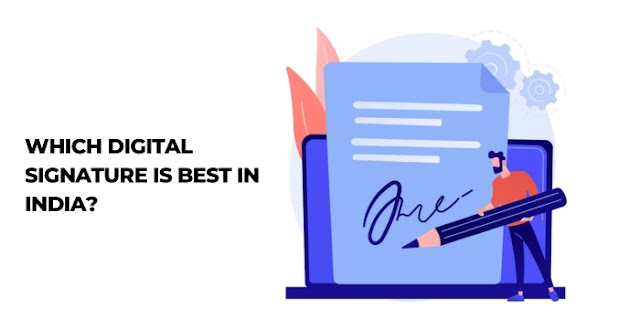Which Digital Signature Is Best In India?
In today's digital age, electronic signatures have become a vital component of business transactions, legal documents, and government processes. They provide a secure and efficient way to sign, share, and store documents electronically. In India, digital signatures are governed by the Information Technology Act, 2000, and choosing the right digital signature certificate (DSC) is crucial for ensuring the legality and security of your online transactions. In this guide, we'll explore the types of digital signatures available in India and help you determine which one is best suited for your needs.
Understanding Digital Signature Certificates (DSCs)
Before delving into the best digital signature options in India, it's essential to understand the different types of DSCs available:
a. Class 1 DSC: Basic Certificate
Class 1 DSCs are the most basic and least secure type of digital signatures. They are primarily used for low-value transactions and verification purposes like email communication. They do not hold any legal validity in most legal transactions.
b. Class 2 DSC: Individual User Certificate
Class 2 DSCs are used for filing income tax returns, GST returns, and company registrations. They validate the identity of the user against a pre-verified database. These certificates are generally used by individuals and small businesses.
c. Class 3 DSC: Organization Certificate
Class 3 DSCs are the highest level of digital signatures in India and are legally equivalent to physical signatures. They require the physical presence of the certificate holder during the verification process. Class 3 DSCs are used for activities like e-tendering, e-bidding, and signing legal contracts.
Factors to Consider When Choosing a Digital Signature
Choosing the best digital signature in India is not just about the provider; several factors should influence your decision:
Certificate Type
The type of DSC you need depends on the nature of your transactions. Ensure you select a certificate that aligns with your specific requirements, whether it's Class 1, Class 2, or Class 3.
Certificate Validity
Digital signatures have a validity period, typically one or two years. Consider how frequently you'll be using the certificate and choose one with an appropriate validity period.
Compatibility
Check if the DSC is compatible with the software and platforms you intend to use for digital signing. Ensure it integrates smoothly with your existing workflow.
Cost
Digital signature cost can vary, so it's essential to compare costs among providers. Keep in mind that while affordability is crucial, it shouldn't compromise the security and trustworthiness of the certificate.
Customer Support
Prompt and reliable customer support can be a lifesaver if you encounter any issues with your DSC. Choose a provider known for excellent customer service.
Legal Framework
It's important to note that digital signatures in India are legally recognized under the Information Technology Act, 2000, and the rules and regulations set forth by the Controller of Certifying Authorities (CCA). Always ensure that your chosen DSC provider adheres to these legal standards.
Conclusion
Choosing the best digital signature in India depends on your specific needs and the level of security and legality required for your transactions. Consider factors like certificate type, validity, compatibility, cost, and customer support when making your decision. Remember that digital signatures play a crucial role in ensuring the integrity and security of your online transactions, so choose wisely. By selecting the right digital signature certificate provider, you can streamline your digital processes and conduct business with confidence in the digital world.
Written by Tulsi Kumar



%20(18).jpg)